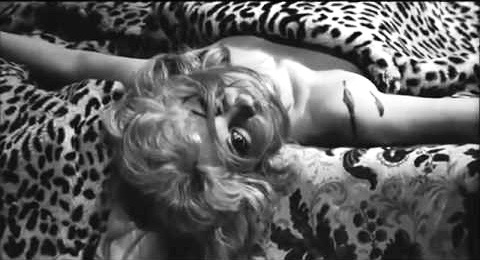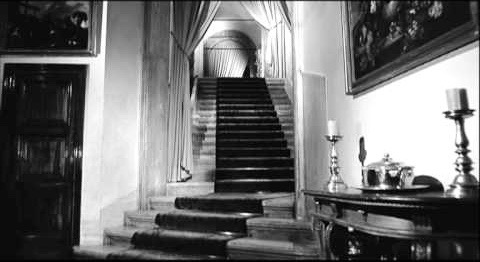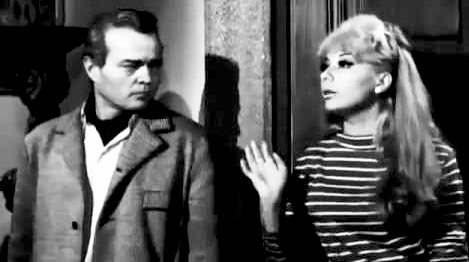 With a tumultuous background of waves crashing against a rocky coast, a descriptive statement from Sigmund Freud on the meaning of libido scrolls down the screen. Part of the Austrian psychoanalyst’s quotation defines libido as “the energy, regarded as a quantitative magnitude… of those instincts which have to do with all that may be comprised under the word ‘love.’” But the film that follows is not about love but rather the perversion of it starting with an opening sequence in which a child witnesses the aftermath of his father’s violent S&M session with a female companion, an incident that scars him for life.
With a tumultuous background of waves crashing against a rocky coast, a descriptive statement from Sigmund Freud on the meaning of libido scrolls down the screen. Part of the Austrian psychoanalyst’s quotation defines libido as “the energy, regarded as a quantitative magnitude… of those instincts which have to do with all that may be comprised under the word ‘love.’” But the film that follows is not about love but rather the perversion of it starting with an opening sequence in which a child witnesses the aftermath of his father’s violent S&M session with a female companion, an incident that scars him for life.
 Cut to the present. We see two cars traveling through the night on a rural road. In one car are Paul (Luciano Pigozzi) and Brigitte (Mara Maryl) and in the following car are Helene (Dominique Boschero) and Christian (Giancarlo Giannini), who is returning to his father’s estate many years after the event that made him a head case. Paul, the estate caretaker, is charged with monitoring Christian’s visit and deciding whether he is mentally and physically competent to inherit the estate.
Cut to the present. We see two cars traveling through the night on a rural road. In one car are Paul (Luciano Pigozzi) and Brigitte (Mara Maryl) and in the following car are Helene (Dominique Boschero) and Christian (Giancarlo Giannini), who is returning to his father’s estate many years after the event that made him a head case. Paul, the estate caretaker, is charged with monitoring Christian’s visit and deciding whether he is mentally and physically competent to inherit the estate.
This is the basic setup for Libido (1965), the directorial debut of Italian screenwriter Ernesto Gastaldi and a future template for so many mystery and erotic suspense thrillers produced in Italy during the mid-sixties through the eighties. All of the key ingredients are here; greed, deceit, insanity, sex, voyeurism, stalker behavior, suicide, murder and a strong suggestion of the supernatural.
Although Libido was made on a low budget, it is compact, atmospheric and engaging on its own modest terms. The slow, deliberate pace and moody tone are in the tradition of such Gothic chillers as Rebecca and The Spiral Staircase but the film is also reflective of its era with amoral characters who could have attended one of the decadent parties staged by Fellini in La Dolce Vita. Hardcore horror fans and gorehounds will find the proceedings tame but there are some memorably creepy set pieces, especially one set during a thunderstorm when the lights go out and Christian sees someone in the garden who resembles his late father (he was rumored to have committed suicide by jumping off a cliff into the sea but his body was never found).

Giancarlo Giannini (in his film debut) and Dominique Boschero star in Ernesto Gastaldi’s 1965 giallo, Libido.
Certainly any fan of the Italian thriller genre known as the giallo is familiar with Ernesto Gastaldi. A prolific screenwriter and story spinner, his fingerprints are all over such trendsetting entries as The Murder Clinic (1966), The Sweet Body of Deborah (1968) and All the Colors of the Dark (1972). In fact, you could say his name is synonymous with a large portion of Italian genre films made between 1960 and the mid-eighties (he often used the screen name Julian Berry). 
Gastaldi’s contributions were key ingredients in every category you can imagine: horror (Werewolf in a Girls’ Dormitory, The Horrible Dr. Hichcock), peplum aka sword & sandal (Alone Against Rome, Perseus Against the Monsters), spaghetti western (Arizona Colt, My Name is Nobody), spy thriller (Secret Agent Fireball, Operation Goldman), war (The Battle of El Amamein, La Battaglia del Deserto), sci-fi (The Tenth Victim, Flashgun), and poliziotteschi aka police drama (The Violent Professionals, Kidnap Syndicate). 
Gastaldi’s track record as a director is much slimmer – only 6 feature films – but Libido is an impressive first effort that recalls some of the unexpected twists and turns of Diabolique. Although Vittorio Salerno is listed as co-director, Gastaldi admitted in an interview with Tim Lucas for Video Watchdog that Salerno only contributed to the screenplay; Salerno’s listing as co-director was done as a favor. In fact, this happened many times in Gastaldi’s career despite the fact that he was usually the sole screenwriter. “The other names you find among the credits were put there only for co-production reasons. Sometimes producers had a few pages of a story, written by people whom they had asked for ideas. It was always a weak idea, so I usually changed it completely while writing the treatment and script. The producers often asked me if I had a problem with these first collaborators also being credited, and I always answered “No.” In those days, contracts were by “forfeit” without any percentage, so I accepted.”

Christian (Giancarlo Giannini) is headed toward a total crackup when he returns to his family estate after 20 years in Libido (1965), directed by Ernesto Gastaldi.
Libido marks the film debut of Giancarlo Giannini and he is convincingly unstable as the haunted protagonist. However, it wasn’t until director Lina Wertmuller cast him in The Seduction of Mimi (1972) that Giannini began to emerge as an international star; each successive Wertmuller film he made (1973’s Love & Anarchy, 1974’s Swept Away) would bring him more critical acclaim and it would reach its zenith with his performance in Wertmuller’s Seven Beauties (1975), the role that garnered him a Best Actor Oscar nomination.
Giannini has the more challenging assignment in Libido playing a character who has to be equally sympathetic and antagonistic but the supporting players are ideally cast and include French actress Dominique Boschero as Christian’s chic but obsequious wife Helene and Mara Maryl as Brigitte, the seemingly ditzy blonde golddigger married to Paul, the estate caretaker.
The latter role is played the prolific Luciano Pigozzi (more than a 100 films), who is sometimes credited as Alan Collins. Pigozzi is often referred to as “the Italian Peter Lorre” due to similar facial features and many of his supporting roles are in a similar Lorre vein, playing sinister parts in films like Castle of the Living Dead and The Unnaturals. He has also appeared in such high profile films as Roberto Rossellini’s General Della Rovere, Vittorio DeSica’s Two Women and Claude Lelouch’s The Crook.
In Libido, Pigozzi could be a red herring or the evil perpetrator but the real scene-stealer is Mara Maryl (Gastaldi’s wife in real life) who turns out to be the wild card in the bunch. Her provocative, striptease-like dance for her husband in the mirrored bedroom is one of the highlights of the film but the movie’s final fadeout is a much grimmer take on that earlier display of uninhibited eroticism. Unfortunately, Maryl didn’t make many movies due to her agreement with Gastaldi (after they married) that she would only appear in films he directed. But she’s a lot of fun in Libido, acting like Latin singer/actress Charo as if she’d wandered into a film version of Agatha Christie’s Ten Little Indians.
Unavailable in the U.S. for years, Libido was released on DVD by Video Dimensions in 2014. I have not seen that version but recommend the DVD-R that is available from European Trash Cinema (in Italian with English subtitles). It is a fine widescreen transfer featuring the black and white cinematography of Romy Garron (according to the credits; this is either a pseudonym or someone who never shot another movie) and an evocative score by the great Carlo Rustichelli (The Organizer, Blood and Black Lace) who seamlessly blends gloom and doom (Christian’s extreme mood swings) with pop culture ambiance (Brigitte playing her transistor radio).
Other websites of interest:
http://henryswesternroundup.blogspot.com/2013/05/interview-with-my-name-is-nobody-writer.html
http://www.videowatchdog.com/home/home.html
https://europeantrashcinema.blogspot.com








Pingback: LIBIDO (1965) Critiques and overview of Giallo homicide thriller thriller – theconnectingnewspaper.com